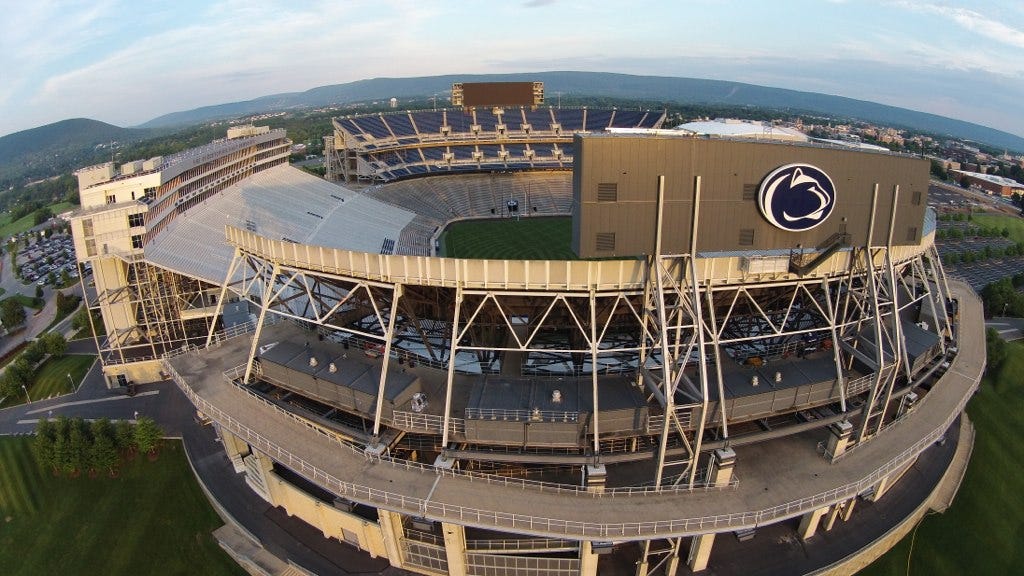
Consensus is the absence of leadership.
I think about this quote from Margaret Thatcher quite a bit. As the Penn State Board of Trustees begins its deliberations of the work to be done to Beaver Stadium, her full quote deserves an airing:
"Ah consensus … the process of abandoning all beliefs, principles, values and policies in search of something in which no one believes, but to which no one objects; the process of avoiding the very issues that have to be solved, merely because you cannot get agreement on the way ahead. What great cause would have been fought and won under the banner 'I stand for consensus'?"
Margaret Thatcher
Penn State’s Board of Trustees is composed of 36 individuals. We bring a vibrant diversity of viewpoints, lived experiences, and skills to the table, and I’m not going to blush when I say that no other Big10 peer can match this. It is our job to ethically oversee the management of the challenges and opportunities Penn State faces, some nuanced, but all eventually impactful.
Yet since 2018, the entire Board has voted to unanimously approve 94% of the proposals brought before it (223 out of 237). Over the last five years, more than 66% of the current Board members have never voted NO on anything, nor has any proposal been voted down or tabled. If Penn State was generating healthy financial statements, scoring high on academic excellence, and had broad alumni support this would not be a problem. Unfortunately, the opposite is true.
The Beaver Stadium project will probably be the largest capital expenditure in Penn State’s history. There should be at least three options on the table; 1) maintain Beaver Stadium to allow continuing operations, 2) do a limited upgrade to certain parts of the stadium, and 3) what I call the ‘Go Big or Go Home’ option of a new stadium. I am keeping an open mind and see value in each of these ideas. You, my friend and valued reader, have an opinion as well and I’d like to hear it (email me at barry@barryfenchak.com and let’s discuss).
I also hear, loud and clear, that this project will impact the university for generations to come, yet have zero impact on Penn State’s educational mission. That there are marginalized communities affected who are being ignored. And that important stakeholders are being left out of the process.
Now is the time to bring our diverse viewpoints to the table and deliberate these issues. I know I’m the local guy who crunches numbers, so before I vote I want to hear from Penn State’s administration and the viewpoints of fellow Trustees. I want to see the impact analyses the University and its hired consultants have performed. We cannot afford to ignore our opportunity to positively impact Penn State’s future by rubber-stamping every thing that comes before us in this deliberation. Open discussion in working sessions would provide much needed transparency.
When I ran for a seat on the Penn State Board of Trustees last year, I asked for your suport and made a promise: I will vote NO to any proposal that is not in the best interests of the University, which means I will likely vote NO quite often. I won’t be afraid to be the lone NO vote if I think the proposal is not congruent with responsible governance. And before I vote NO, I will work to educate the other Trustees on better options.
I have been committed to doing that (see here, here, here and here). Since joining the Board last summer, of the 45 items brought up for a vote I have found 15 of them to not be in the University’s best interest and voted NO all 15 times. Thirteen of those times I was the lone dissenting NO vote, the only voice bringing diversity of thought to Board ‘consensus’.
I am looking forward to the hard work it’s going to take to thoroughly vet the situation before us. I hope I have some company.
“If everybody is thinking alike, then somebody isn’t thinking.” General George S. Patton
As a member of the Penn State Board of Trustees, I will from time to time be made aware of certain confidential information. I will also engage with Trustees and administrators in private, off-the-record conversations, with the expectation of privacy on both parties. I take these expectations seriously, as they are required in order to catalyze important discussions.
As a fiduciary, it is also important that I engage in conversations with all stakeholders of the University. Stakeholders like you. Discussions will involve publicly available information and issues before the Board, as well as my personal thoughts, concerns, and ideas. I also will continue to solicit your thoughts, concerns, and ideas, and plan to engage in meaningful conversations with you on those topics. I hope that you will continue to share your concerns and ideas with me.
You can contact me via my website, barryfenchak.com.



